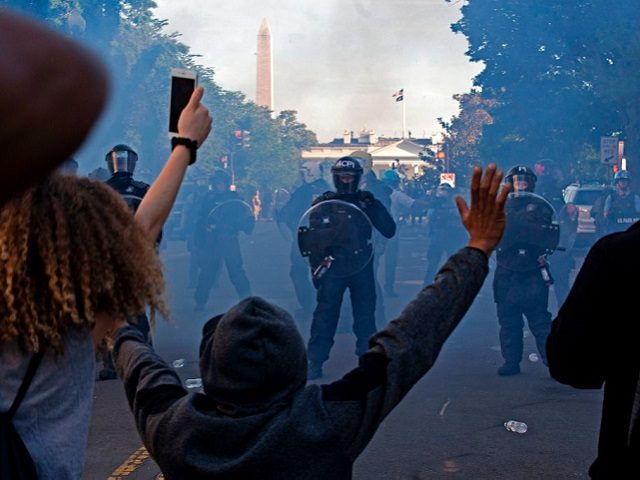The ACLU called the use of tear gas and pepper spray a “grossly unjustified use of a chemical weapon on protesters.” The group continued, saying the issue “raises serious human rights concerns under international law.”
Late Monday night, the ACLU tweeted a statement that the use of tear gas to control crowds of protesters outside the White House “appears to be grossly unjustified use of a chemical weapon on protesters and raises serious human rights concerns under international law.”
This appears to be grossly unjustified use of a chemical weapon on protesters and raises serious human rights concerns under international law.
Elected officials, including Congress, must investigate this politically-motivated, life-threatening use of indiscriminate weapons. https://t.co/eTAJ5cdecb
— ACLU (@ACLU) June 2, 2020
Their statement came in response to a journalist’s tweet reporting the use of tear gas on “peaceful protesters” outside the gates of the White House against protesters.” Reporter Yamiche Alcindor said she was among those “teargassed.”
While technically, tear gas is a classified as a chemical weapon that is banned in warfare, it is commonly used by law enforcement agencies all over the world.
An article published by The World (a news outlet produced in part by the BBC) in July 2019 says, “Tear gas is a chemical weapon used all over the world by law enforcement to control riots and disperse crowds — from the United States to Hong Kong, to Venezuela.”
The reporter interviewed ACLU Director of the Human Rights Program Jamil Dakwar of the ACLU on the topic. He claimed that tear gas really is a chemical weapon developed during World War I.
“Then, it was developed into the more modern tear gas,” Dakwar told The World. “It causes serious burning, feelings of suffocation and obviously, tearing. It’s used now more massively than ever by law enforcement.”
He went on to call it a “less-lethal” weapon when used outdoors,” as in the case of the protests outside the White House Monday night.
A February 2010 article by SlateGroup asked the question about the legality of tear gas after police in Haiti, Venezuela, Sri Lanka, and Iran utilized tear gas into crowds of protesters.
“Aren’t chemical weapons like tear gas illegal,” the article’s author asks. “Yes but only in war,” he responded to his own question.
The article explains that it is technically not a gas, but a powder mixed with smoke. “CS has no long-term effects when used properly.”
” When deployed in open spaces, the effects of tear gas are indeed temporary,” the article explains. “Victims may experience crying, uncontrollable blinking, burning in the throat, sneezing, coughing, retching, and sometimes temporary blindness—but all that should subside within hours.”
The article cites the 1993 Chemical Weapons Convention which states the ban on tear gas does not apply to domestic law enforcement. The United Nations treaty was signed by the United States in the final days of the George H.W. Bush administration and ratified under the Clinton administration in 1997, the Arms Control Association reports.
The tweet by the ACLU received thousands of likes and retweets from others on the platform.
Twitter User Kathleen Phillips (@Katphillips48) replied, “Give me a break!!! Is the ACLU going to defend the rights of all the innocent protestors and business owners beat up by the ANTIFA thugs? How about the cops hit and injury by bricks and rocks thrown at them??”
Give me a break!!! Is the ACLU going to defend the rights of all the innocent protestors and business owners beat up by the ANTIFA thugs? How about the cops hit and injury by bricks and rocks thrown at them??
— Kathleen Phillips (@Katphillips48) June 2, 2020
Twitter user Gueltario Tumafletas (@Gueltario) responded to the ACLU’s classification of tear gas as a chemical weapon saying, “Chemical weapons are lethal, just so you know.”
Chemical weapons are lethal. Just to let you know.
— Gueltario Tumafletas (@Gueltario) June 2, 2020
To which Chesari (@chesari4) replied that tear gas is banned from international treaties from being used in wars.
You duped yourself, this is not a war.
— Gueltario Tumafletas (@Gueltario) June 2, 2020
At the time of this publication, the ACLU’s tweet had more than 11,000 likes and 5,000 retweets.
Bob Price serves as associate editor and senior news contributor for the Breitbart Texas-Border team. He is an original member of the Breitbart Texas team. Price is a regular panelist on Fox 26 Houston’s What’s Your Point? Sunday-morning talk show. Follow him on Twitter @BobPriceBBTX and Face

COMMENTS
Please let us know if you're having issues with commenting.